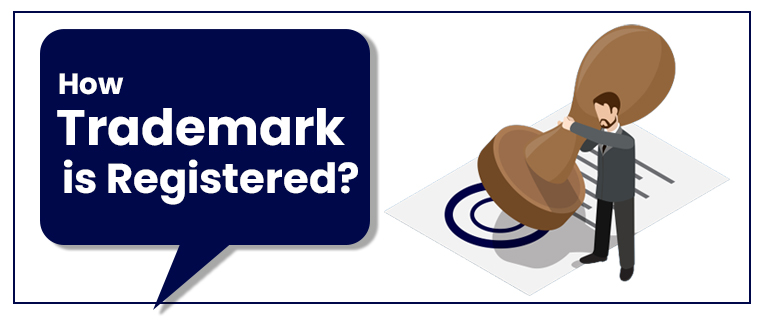How Trademark is Registered?
Trademark represents the symbols, characters, numeric, or combination of colors that are utilized by the firm to distinguish its offerings (products or services from other companies existing in the market. In simpers terms, it is considered as the unique signs or symbols that help in the identification of the goods or services of a specific company.
Being identified as intellectual property it represents a brand of an organization by registering the trademark, a business protects the brand image. It also helps in setting the brand of your company to stand apart in your specific industry.
Overview of Trademark registration in India
The diverse items like your company’s logo, brand name, slogan, color, or any other unique sign can be registered under the trademark (TM) in India. It sets the unique goods & services of your business apart from others in the industry while at the same time maintaining your distinguished brand identity & providing protection from any of its misuses.
The
trademark registration procedure is overseen by the Controller General of Patent, Designs & Trademark (CGPDTM) & it is being registered under the trademark act (1999). So, to register a trademark you can apply by filing your application with the Registrar of Trademarks.
Importance of trademark registration
In, India trademark registration is relevant as it protects the brand identity of the business. Since, TM is the intellectual property and thus it provides the legal rights to your unique brand, boosts its overall value while at the same time assuring the consumers about the quality of the products/ services of your business.
Benefits that trademark registration provides
- Since trademark registration is designated as intellectual property and thus it is protection to the businesses against the infringement process.
- Trademark helps in product differentiation as it is individualized to the goods or services that your company offers.
- Trademark makes it convenient for individuals to recognize your unique goods in general. It contributes to the overall image of your brand. Thus, helps consumers to link the quality, performance & other attributes of the products to the brand making them.
- Trademark imparts ownership rights to the registered proprietor. So, the proprietor possesses the power for any illegal usage and can also file a lawsuit against any business or individual who is utilizing the registered trademark without any authorization.
Read Also This - Apply Patent Registration Online In India
Trademark Categories
There are overall 45 trademark categories and all the goods as well as the services are being classified across the same. You are required to be extremely careful & select the right category of your products/services as this is going to determine the overall validity of trademark registration of your specific business.
In the case of running your business across different goods/services, you are required to trademark it under all the applicable categories.
Here are some of the main categories of trademarks in our country:
Category 9
- This trademark category includes IT software & electronic products.
Category 25
- This category of a trademark is the inclusion of garments.
Category 35
- This class incorporates trademark for business management as well as advertising products.
Category 41
- This TM category covers the education & also entertainment industry.
Eligibility Criteria to apply for trademark?
The trademark registration is meant to protect any business brand, logo, or any other unique symbol. The filing for trademark registration in India can be done by individuals, companies as well and non-profit organizations (NGOs). So, when it comes to the eligibility of filing the trademark registration, here is a list of the entities that are eligible for the same.
Read Also This - Import Without A BIS Certificate
- Individual
- Joint Owner
- Firms (Proprietorship/ Partnership)
- LLPs (Limited Liability Partnership)
- Indian Companies
- Any foreign-incorporated identity
- On behalf of trust/ society
What documents are needed to register trademark (TM) online?
Any person, whether holding Indian or foreign nationality can apply for trademark registration online. Also, the paperwork submitted needed to register a trademark under the name of proprietorship should be similar to the one required for TM registering under the individual’s name.
- Pan card of individual/ sole proprietor
- Adhar card of individual/ sole proprietor
- Incorporation certificate (in case TM is registered under company/LLP)
- Brand name & Logo
- GST (if any)
- MSME (in case any)
- Signed Power of attorney document
- Signed form TM-48
Steps for registering trademark India
The trademark acts as the jurisdictional rights just like other types of tangible assets, there is a possibility of licensing, selling, and purchasing and can also be put forward as the security while obtaining loan.
Also, if a business registers a trademark, then it provides the most exclusive identity to its brand image, thereby safeguarding and protecting it. A trademark once registered can be utilized for as long as 10 years. Upon renewal, it remains valid for the next 10 years, and so on. The application fee needed to register a trademark is just a one-time process and it takes around 6- 12 months with a validity of a decade.
Read Also This - EPR For Plastic Waste In India
"For registering a trademark, given below are some of the basic steps that every business owner must go through:"
Trademark Search
This is the first, foremost, and most eminent of the steps to apply for trademark registration. All existing trademarks are already listed under the trademark registry. So, make sure to conduct in-depth, detailed, and thorough research for finding out whether the trademark you intend to file is unique and distinctive and if there is any already existing similar mark listed or not. Thus, trademark search enables the business owner to determine if there is any competition already existing in the industry or not.
File trademark application
After conducting thorough research, the next step is to file your application for trademark registration. The application is to be filed in Form- 48 & TM-1 & can be submitted either online at the official website of the trademark registration office or dropped physically as per the jurisdiction.
Trademark Examination Procedure
After filing the trademark application, it will be thoroughly evaluated by the registrar. The examination report will be prepared & a copy of the same will be sent to the applicant giving the time of one month to file a reply and also include all the material in support of their decision.
Trademark Publication
After the acceptance of the application, it gets published within the trademark journal and be on the same for a period of 4 months. This is an extremely vital step to register a trademark, and after publishing there should not be any sort of opposition within the period of 90/120 days, from the date of your application.
Issuance of certificate
In case of filing of no opposition within the stipulated duration of 90 days, there will be acceptance of your application at the registrar's office. After that, there will be issuing of the registration certificate which will bear the seal of the trademark registry.
Application Status
After getting the confirmation of the filling of your application, there will be an allocation number which will be assigned to the applicant and it can be tracked online. In case of finding no issues within your filed application, you are going to learn about its rejection or approval within 18- 24 months.
Read Also This - Get EPR Certificate For Your E waste Management
Final registration procedure
The receipt of the certification of trademark registration will certify clearly that your trademark has been registered now and is fully protected under the concerned jurisdiction. The registered trademark certification remains valid for 10 years from the date of the application filing. After one decade, there will be re-registration required for your trademark and there is a possibility of renewing the same indefinitely.
Trademark Objection (in a few instances)
There might be the possibility that the registrar may ask some questions regarding your application. This will be sent to the applicant as a notice of trademark objection. So, you are required to reply to the questions in the notice within 30 days.
Trademark Opposition (in a few instances)
There is also another possibility that the third party may oppose your trademark application. In such an opposition instance, you will be required to carry out the submission of the counter-statement to the registrar within 60 days, citing reasons why the opposition is not at all valid. So, it is only upon the basis of your framed responses that, the registrar may take the action of dismissing the opposition or calling for a hearing.
Although registration appears simple & straightforward, it is a bit complex and thus, you are advised to take the help of experts.










